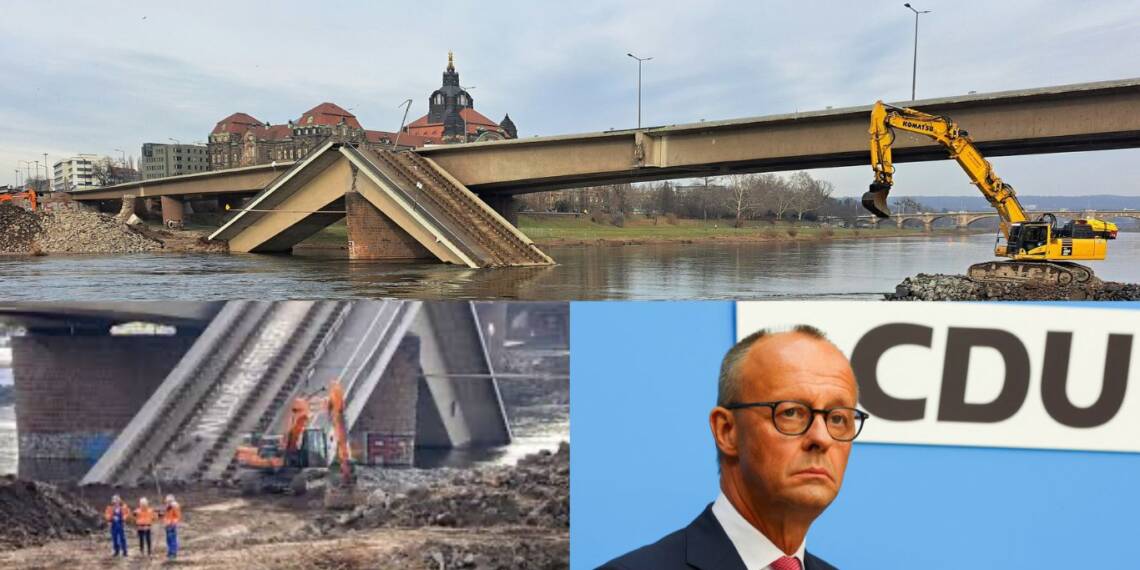Germany’s strong image of efficiency is suffering because of crumbling Infrastructure. Cracks and collapses are now also putting Europe’s biggest economy at risk. The EU’s most populous country and biggest economy, Germany, is trying to fix its worn-out Infrastructure.
Around 4,000 bridges need repair or replacement in the next 10 years. Often, surprise damages are now forcing sudden bridge closures, causing huge traffic jams. Germany is already facing an economic slowdown due to several reasons, including a lack of oil and gas in Germany due to the Russia-Ukraine war. In this situation, It would be difficult for Germany to repair the required Infrastructure.
Cracks and a collapse
In Dresden, a bridge from 1971 partly collapsed one night in September because of corrosion. Nobody was hurt, but traffic was blocked, and ships couldn’t pass on the Elbe River. The broken Carola Bridge still lies in place.
The collapse led to checks on similar bridges. One in Bad Schandau, near the Czech border, was shut in November for safety checks. Locals had to drive 20 kilometres to the next crossing. The bridge reopened on Thursday but now has a 7.5-ton weight limit.
“The bridge closure was a disaster for Bad Schandau,” said Steffen Marx, a civil engineering professor who led stress tests. “It caused classic gridlock. There’s no other crossing for almost 50 kilometres of the river.”
Even as Bad Schandau’s problem improved, Berlin faced its own trouble. A crack forced the sudden closure of a bridge on a busy highway last month. The bridge will now be torn down. The closure caused major traffic jams and shut a railway line for weeks, and the government quickly promised 150 million euros ($164 million) for rebuilding.
Saving and splurging
The world knows Germany for its excellent engineering. “Germans are great engineers. You’d expect everything to work,” said Monika Schnitzer, head of an economic advisory group. “But Germans are also great savers. They saved too much on Infrastructure, especially bridges.”
Germany’s next government has started acting before taking office. Last month, the coalition led by Friedrich Merz pushed a 500 billion-euro ($551 billion) fund through parliament. The money borrowed by the state will be spent on old Infrastructure over the next 12 years. The aim is to revive the slow economy.
Bridges aren’t the only problem. Schools are also falling apart. The national railway is under heavy repair after long neglect. Train delays and breakdowns are now a common complaint in Germany.
The new coalition deal says, “Good infrastructure is the base for prosperity, social unity, and sustainability.” The plan covers hospitals, schools, bridges, and railways.
For roads, the deal promises money to fix the “renovation backlog” for bridges and tunnels. The current government says many bridges were already fixed under a plan started in 2022. But much more work is still needed.
It’s not just the money
“Now there’s money, Germany could grow fast,” Schnitzer said. “But the money must be spent quickly. For that, planning and approval must speed up.”
She said Germany has shown it can move fast — like when it built its first LNG terminals quickly after Russia’s invasion of Ukraine in 2022.
Government spokesman Steffen Hebestreit said there aren’t enough construction firms and machines. Germany is “at its capacity limit.”
Marx said the state of Germany’s Infrastructure is “quite critical.”
“It’s not only about money,” he said. “The real problem is we don’t take care of things. We skip cleaning, fixing, and strengthening — things we all do for private houses.”
He agreed the new fund is needed. But he fears it will all go into tearing down and rebuilding the worst bridges rather than keeping others safe.
“You can’t win votes with maintenance. It’s boring and not exciting,” Marx said. “But when you skip it, things become spectacular.”
Other Issues in Germany
Germany is not only suffering from decaying infrastructure but also from a decaying society and economy. Immigration and crimes have also increased in the German Society. Ordinary people of Germany are also facing economic distress due to increased inflation and economic recession. Politically, Germany had to go for an election before the full term, and all traditional parties did not perform well. Alternative for Germany (AfD) came second, showing the German citizens’ anger towards liberal parties because they failed to provide basic needs to their citizens. The upcoming years would be crucial for Germany in all spheres.








